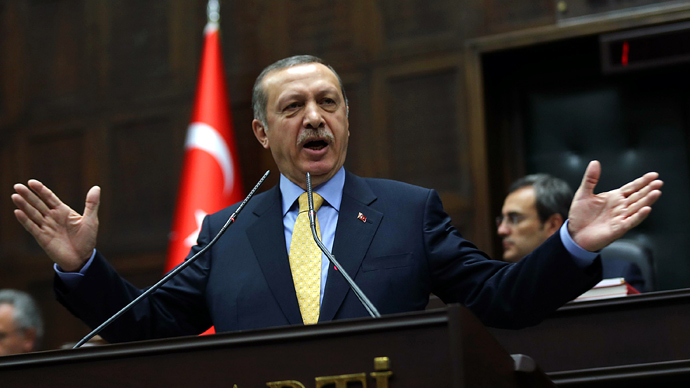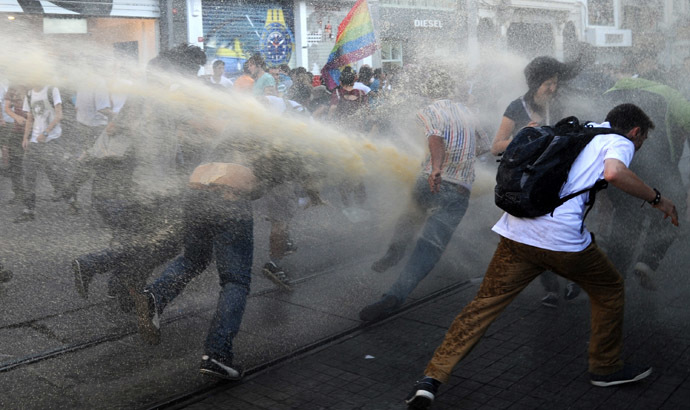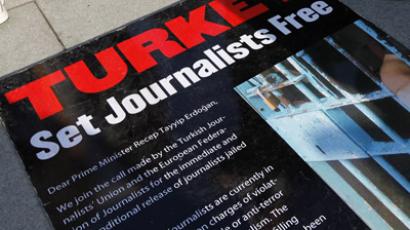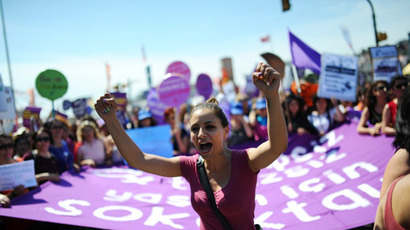‘Not freedom but treason’: Erdogan slams Turkish media over whistleblowing

Turkish PM has equated whistleblowing to “treason” when he slammed a Turkish daily for leaking state documents that included information on government’s profiling of citizens and surveillance on activities of religious groups.
“I now see that some media groups are hand-in-hand,” PM
Recep Tayyip Erdogan said in the town of Tekirdag as cited by
UPI. “Exposing state secrets is not freedom but absolutely
treason to the country and homeland.”
Erdogan was speaking in reference to the leaked documents that
Taraf daily published late November and earlier this month. The
Turkish constitution, Erdogan reminded, strictly prohibits
whistleblowing saying no one has a right to leak state secrets.
“I’m addressing those who accuse the government of profiling
people. Who has leaked this intelligence information to your men,
your supporters?” Erdogan asked, abruptly changing the
subject.
The Turkish leader’s remarks come a day after authorities
launched a probe looking into a case of Mehmet Baransu a
journalist at Taraf. The filings of complaints were done by
Erdogan's office and two intelligence agencies, the MGK and MİT.
The investigation is looking at charges of “obtaining
documents regarding state security,” “political or military
spying,” “exposing documents regarding the state’s security or
political good,” and “revealing forbidden
information.”
The first record Taraf published was a leaked document from
Turkey's National Security Council (MGK), of a secret plot
against Hizmet, a movement founded by Islamic scholar Fethullah
Gulen.
The 2004 document, endorsed by a number of politicians –
including Erdogan and the foreign and justice ministers at the
time – asked the government to monitor Gulen's domestic and
foreign activities, including private schools, student housing
and foundations.
Taraf also published a series of documents leaked by journalist
Mehmet Baransu implicating the PM and the National Intelligence
Organization (MİT) of profiling and blacklisting citizens in
connection to religious groups. The publication also said the
authorities continued to track the groups between 2011 and 2013,
despite government’s claims it had stopped such practices back in
2010.

Earlier in the week Omer Dincer, member of the Justice and
Development (AK) Party who was Prime Ministry undersecretary in
2004, said that the government never implemented the proposal
outlined in the leaked document, UPI reports. The politician said
that then government of Mesut Yilmaz set up a council to monitor
religious groups but the council was dissolved in 2010.
‘Prison for journalists’
With Turkish government’s continuing crackdown on journalists,
the Reporters Without Borders called Turkey the
“world’s biggest prison for journalists” last year.
“With a total of 72 media personnel currently detained, of whom
at least 42 journalists and four media assistants are being held
in connection with their media work, Turkey is now the world’s
biggest prison for journalists – a sad paradox for a country that
portrays itself a regional democratic model,” Reporters
Without Borders said. The independent organization also wrote
that “critical and investigative journalism is often
criminalized."
Ever since the police stormed Istanbul’s Gezi Park on 15 June,
Reporters Without Borders have exressed deep concern about the
government’s treatment of the press. The advocacy group stated
that reporters “are accused of acting at the behest of
‘external actors’ or in collusion with ‘terrorist organizations’
with the aim of destabilizing the country.”
Another freedom of speech advocacy group the Committee to Protect
Journalists has
sent a letter to Erdogan outlining concerns over “jailing of
journalists in retaliation for their work,” “heated anti-press
rhetoric coming from the top echelons of power,” and an attempt
to censor news coverage.
The Committee also noted government’s “official threats to
restrict Turkey's social media” and the crackdown on
journalists “in retaliation for their independent or
pro-opposition coverage of June's anti-government rallies.”














